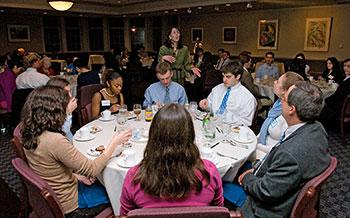 In front of each guest at the Gracious Dining seminar held over Interterm was a cloth napkin, folded elaborately, and multiple forks, knives, spoons, plates and glasses—a veritable etiquette obstacle course. |
It was a typical Sunday evening in Valentine Dining Hall as students in jeans and sweatshirts chowed down and talked noisily. Just across the hall, though, in the Lewis-Sebring Dining Commons, another group of students—ladies in skirts and jewelry and gentlemen in ties and jackets—began to mingle. They’d been instructed to mingle, in fact, and the topic on everyone’s lips was how exactly to behave at this, Amherst’s first Gracious Dining seminar.
Among the dinner guests was Rosalind Hoffa, director of the Career Center and associate dean of students. Students regularly seek her advice on how to handle meals with potential employers. That’s why, as part of a three-day Interterm program on career choices, the Career Center sponsored this seminar on the proper way to partake of a four-course dinner. “Increasingly,” Hoffa says, “interviewing and connecting and networking are done in social situations.”
With mingling now accomplished, the more than 60 students and alumni took their seats at candlelit tables. In front of each guest was a cloth napkin, folded elaborately, and multiple forks, knives, spoons, plates and glasses—a veritable etiquette obstacle course.
A few guests, like Eunice Ko ’09, faced the meal with confidence: her mother used to take her to fancy restaurants as practice. “She’d tell me, ‘Oh, this fork is for this. You should wait for people to pull out your chair,’” Ko said.
Others saw etiquette as forbidding territory. John Barbieri ’09 has always found formality “silly and unnecessary.” He wondered, “Who decides what formal is? Like, what if formal is wearing a T-shirt and jeans? Why can’t that be formal?” He came to the dinner for practical reasons: “I figured that I can’t change the whole world and make it not formal. It’ll probably be useful in most job settings.”
As the meal began, etiquette instructor Jodi R.R. Smith weaved around and between the tables. “People generalize competence based on behavior,” she told the crowd: well-mannered people are perceived as smarter, kinder and more skilled. Smith is founder and president of Mannersmith, an etiquette consulting service that conducts seminars for businesses—and for an increasing number of colleges. She guided the diners through salad, potato-leek soup, a chicken entrée and a chocolate tart. She explained that etiquette customs reflect aesthetic principles and honor cultural traditions, but that etiquette is, overall, about making everyone feel respected and comfortable.
Students posed tricky questions: What does one do with bits of unwanted food? (Push them discreetly to the edge of the main plate. “We’re not allowed to use our bread-and-butter plate as a Siberia,” Smith said.) What if someone has broccoli stuck in her teeth? (Let her know, quietly. “A small embarrassment now is better than a large embarrassment later.”)
The diners-in-training inevitably suffered their own small embarrassments—at least one fork tumbled to the floor—and nervous giggles prevailed. The lesson only proved that it takes much practice to master the more complicated and specific rules. (At what angle should silverware rest on the plate, again?)
Still, the students left with a firm grounding in how to mix business with dinner: Show up 10 minutes early. Be prepared to chat about anything—except your recent wisdom-tooth extraction. And, Smith said, “just because you can fit something into your mouth doesn’t make it bite-sized.”
Read more about the author’s adventures in etiquette, and post comments, on the Campus Buzz.
Photo: Charles Quigg '09